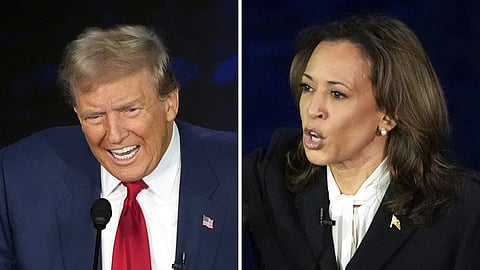

With less than a day to go before America votes for its new president, neither contender—Republican Donald Trump nor Democrat Kamala Harris—has the edge in the seven key battleground states that could determine the outcome of the election. Neena Gopal from Global Express explores the internal dynamics between the two candidates and the global impact of either candidate's victory in a two-part discussion. Joining her are four guests: Ms. Maya Mirchandani, Mr. Bharat Gopalaswamy, Dr. Gulshan Sachdeva, and Dr. Waeil Awwad.
US polls poised at knife’s edge
"[Kamala] was initially seen as someone reaching out to the liberal, left-leaning voices. But I think two things have happened: first, as the war in the Middle East has progressed, Harris has taken a centrist position that may have alienated many of her original liberal supporters. Second, the American political landscape has become so insular,” says Maya Mirchandani, journalist with NDTV and two-time recipient of the Ramnath Goenka Award for Excellence in Journalism.
Of the nine national surveys published recently, three indicate Harris is leading, three show Trump ahead, and the remaining three suggest a tie. The even split of votes between Harris and Trump is heavily influenced by the latter’s extensive use of intimidation and fear tactics, says Maya.
While many Republicans are hesitant to see the White House co-opted by an ultra-right-wing agenda, Trump’s polarising politics still enjoys a strong fan base, she adds.
Although there may be disagreement over what Harris represents, Maya points out that a larger, more pertinent question is: “Is America ready for a Black, Asian woman of colour when it has railed against all these things?”
"Trump will not accept the results of November 5, if he doesn’t win,” says Bharat Gopalaswamy, former director of the South Asia Centre at the Atlantic Council.
According to recent polls and estimates, the race is extremely close. However, Trump has already laid claim to the White House, regardless of the outcome, Bharat adds.
"The Republicans have chosen a singularly bad candidate in Trump," he says. "The Republican Party you see now is a Trumpism Republican Party, not the traditional Republican Party … that’s an important distinction to make," he adds.
‘Immigration cannot be criminalised’
Republicans were historically supportive of immigration, Bharat notes. However, illegal immigration has become a significant issue in the United States due to the open-border policies they once endorsed, Maya points out.
Immigration may have affected employment, she says. It has also influenced interfaith, interracial, and intergroup relations, where a segment of Americans prefers that whites and non-whites live separately. This stance is perplexing, she adds, because “the rhetoric against illegal immigration is often aimed at the same people who have been assimilated over time.”
Many immigrants flee dire situations—be it natural disasters, organised crime, poverty, or conflict—in search of a better future for themselves and their children. While Biden and Harris have introduced legislation to curb illegal immigration, Trump has repeatedly targeted the children of illegal immigrants born and raised in America, Maya says.
“The American immigration system is fundamentally broken,” Bharat comments.
‘Import ban impossible’
Trump’s claims that imposing tariffs on imports and ban on imports from China are unrealistic and will cause more harm than good, says Bharat. “Raising prices will put heavy burdens on the working class voters that he claims he wants to support.”
America depends too much on China for manufacturing and has outsourced the American economic policy to the Wall Street; “the United States from 1945, has promoted globalisation, sometimes hypocritically also financing the growth of major economies around the world, and built public goods in the international system,” Bhrat notes.
Outsourcing is the reason why goods are available at lower costs but also why rural economies are deprived of employment. Sudden changes in economic policy will not solve a long term problem; “the Harris administration would ensure some form of continuity. And what do investors look for? What do many people look for? Certainty, stability and continuity,” he adds.
“At the end of the day, there has been a rot in the American system and institutions; the loopholes that have existed, have been systematically used to manipulate policies. And Trump, in a perverse way, has exposed that rot in the American system. That's very interesting,” notes Bharat.